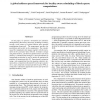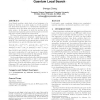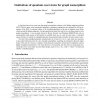508 search results - page 41 / 102 » Poly-locality in quantum computing |
QCQC
1998
Springer
14 years 26 days ago
1998
Springer
Abstract. A quantum computer can efficiently find the order of an element in a group, factors of composite integers, discrete logarithms, stabilisers in Abelian groups, and hidden ...
IPPS
2007
IEEE
14 years 3 months ago
2007
IEEE
In this paper, we present a mechanism for automatic management of the memory hierarchy, including secondary storage, in the context of a global address space parallel programming ...
STOC
2006
ACM
14 years 9 months ago
2006
ACM
Local Search problem, which finds a local minimum of a black-box function on a given graph, is of both practical and theoretical importance to combinatorial optimization, complexi...
ICQNM
2008
IEEE
14 years 3 months ago
2008
IEEE
Coin flipping is a cryptographic primitive in which two spatially separated players, who in principle do not trust each other, wish to establish a common random bit. If we limit ...
STOC
2006
ACM
14 years 2 months ago
2006
ACM
It has been known for some time that graph isomorphism reduces to the hidden subgroup problem (HSP). What is more, most exponential speedups in quantum computation are obtained by...



